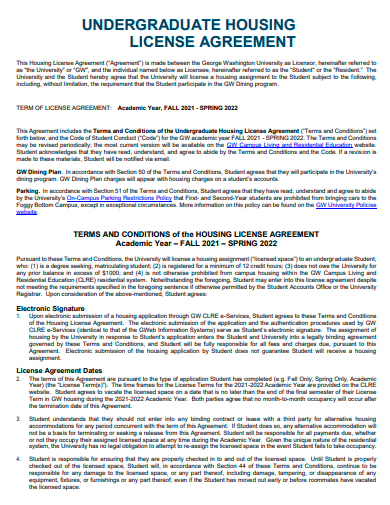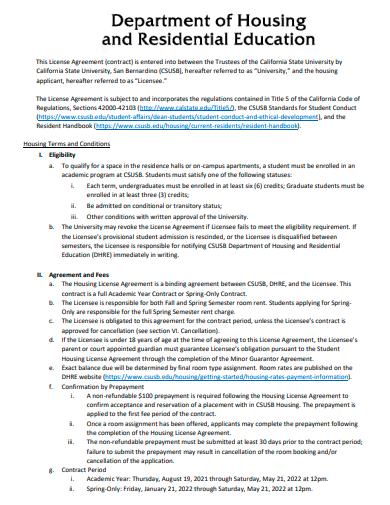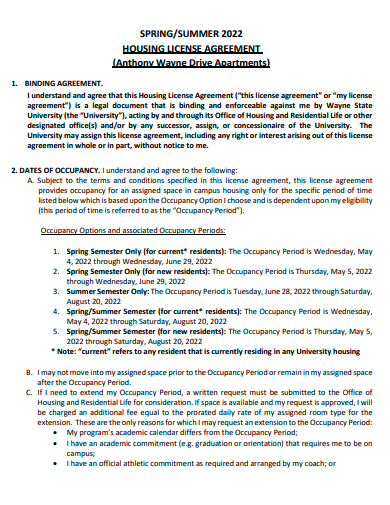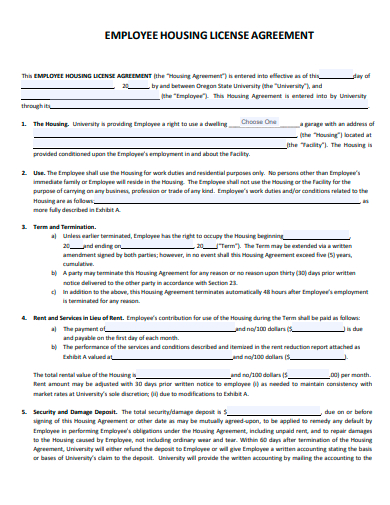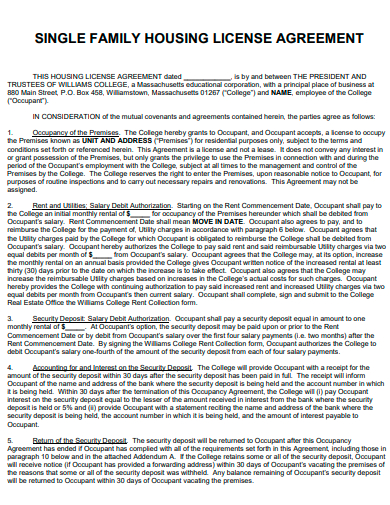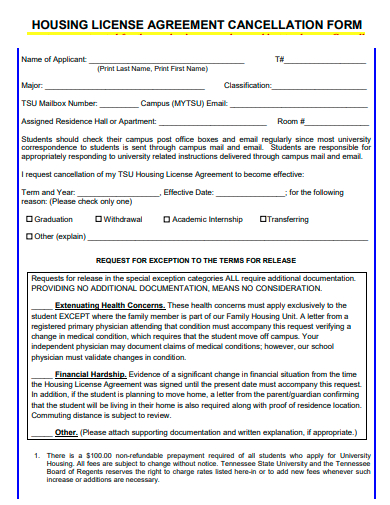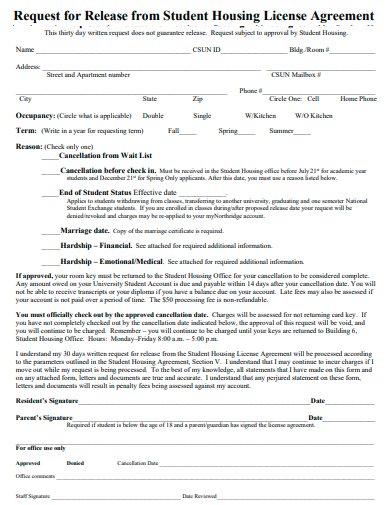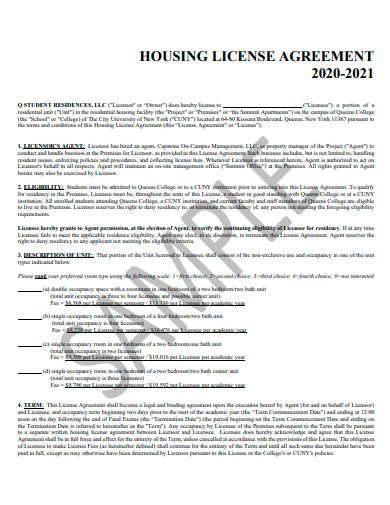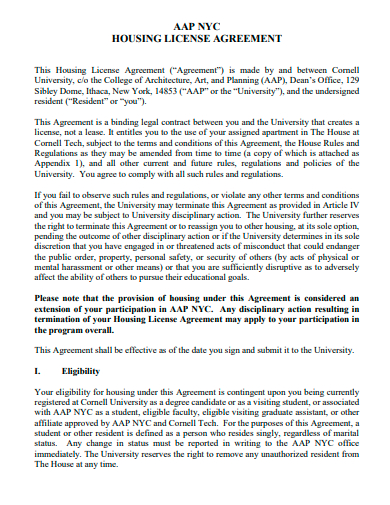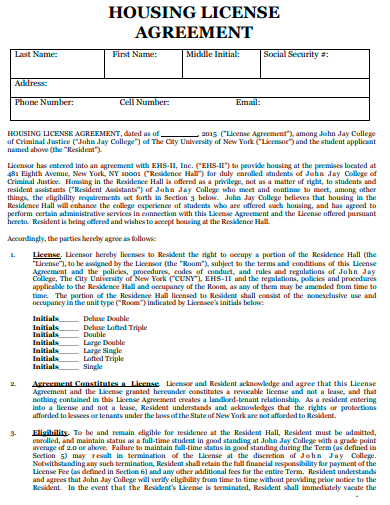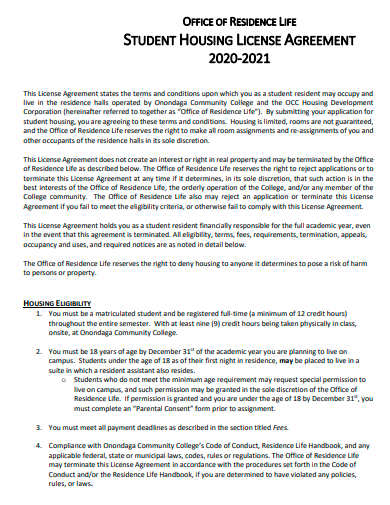A license agreement gives the licensee the right to be protected from unlawful eviction when it comes to residential property. This implies that the licensor must get a possession order before the licensee can be legally removed from the property purchase. On the other hand, a license agreement is not to be confused with an excluded license agreement. The licensee has no protection against eviction if the agreement includes an excluded licensing provision.
FREE 10+ Housing License Agreement Samples
1. Undergraduate Housing License Agreement
2. Department of Housing and Residential Education License Agreement
3. Housing License Agreement in PDF
4. Employee Housing License Agreement
5. Single Family Housing License Agreement
6. Housing License Agreement Cancellation Form
7. Request for Release from Student Housing License Agreement
8. Sample Housing License Agreement
9. Printable Housing License Agreement
10. Housing License Agreement Format
11. Student Housing License Agreement
What Is a Housing Licensing Agreement?
A housing licensing agreement is a formal, written agreement between two parties in which one party, typically the owner of the property, grants permission to another party, typically a third party, to use the owner’s brand, patent, or trademark. The agreement, which is set up between the licensor, who is the property owner, and the licensee, who is the party that is entitled to use it, includes specifics on the type of licensing agreement, the terms of usage, and how the licensor is to be reimbursed for their work. Different kinds of contracting agreement are used for different kinds of licenses. In addition, licensing agreements help to resolve any disagreements that may arise around sales, quality policy concerns, or royalties.
How To Make a Housing Licensing Agreement?
In housing licensing agreements, the terms and conditions under which one party may utilize the property that belongs to another party are spelled out in great detail. Although the properties in question can include a wide variety of things, such as real estate holdings and personal possessions, licensing agreements are typically used for intellectual property, such as patents and trademarks, as well as copyrights for written materials and visual art. This is because intellectual property is more challenging to steal than physical property.
Step 1- Meet the Contract Lawyer
They know necessary to assist you in drafting a license agreement that is equitable and serves your best interests. In the same vein, they are familiar with the appropriate formatting and legal vocabulary, which helps to ensure that the document can be used effectively in court, should that become required.
Step 2- Build Ownership
Before moving forward, ensure you have the proper ownership of whatever you plan to license. For example, if you have a trademark, you want to make sure that it is registered. Another thing to consider is whether or not the asset is being used by anyone else who is also attempting to lay claim to it as their own.
Step 3- Prepare for Ownership Dispute
Be sure that your contract addresses what would take place if someone contested your ownership of something. Consider the scenario in which someone asserts that they own the copyright to something over which you believe you have the authority to grant a license. Similarly, you need to be aware of the appropriate course of action to take if someone plagiarizes the work that is protected by this license.
Step 4- Discuss Royalties
Monetary compensation is the central focus of practically all license agreements. Make it a point to talk about the numerous ways that royalties are paid in the various scenarios that could occur. Discuss what would take place, for instance, if the licensee did not make the estimated amount of sales if you have a percent royalty.
What is an example of an agreement to license something?
An example of a licensing agreement is a contract that is made between the owners of the copyright of a piece of software and another firm. This deal gives the second company permission to use the software in the day-to-day operations of its business.
What are the two categories of license agreements that are available?
There are typically three different license agreements: exclusive, sole, and non-exclusive. In the case of an exclusive license, the only entity permitted to use the intellectual property in question is the licensee.
What are three things one is permitted to do once they have obtained a license?
A standard licensing arrangement has the licensor granting the licensee the right to manufacture and sell items, apply for a brand name or trademark, or make use of copyrighted technology that is controlled by the licensor.
For sole proprietors, inventors, and the owners of many different types of businesses, entering a housing licensing agreement can be a lucrative business move. A license is an agreement between you, the licensor, and another party, the licensee, to bring your product to market. You are the licensor, and the licensee is the party who will use your product. In exchange, you will earn either a one-time payment or royalties on the merchandise that is sold.
Related Posts
FREE 10+ Trial Agreement Samples In MS Word | Google Docs | Apple Pages | PDF
FREE 9+ Shop Rental Agreement Samples [ Commercial, Lease, Tenancy ]
FREE 10+ Charter Agreement Samples In MS Word | Google Docs | Apple Pages | PDF
FREE 10+ Mentoring Agreement Samples In MS Word | Apple Pages | PDF
FREE 10+ Partner Agreement Samples In MS Word | Google Docs | Apple Pages | PDF
FREE 10+ Individual Agreement Samples In MS Word | Google Docs | Apple Pages | PDF
FREE 10+ Strategic Agreement Samples In MS Word | Google Docs | Apple Pages | PDF
FREE 10+ Equity Agreement Samples In MS Word | Google Docs | Apple Pages | PDF
FREE 10+ Producer Agreement Samples in MS Word | Apple Pages | PDF
FREE 10+ Grant Agreement Samples In MS Word | Apple Pages | PDF
FREE 8+ Meeting Agreement Samples in MS Word | Google Docs | Apple Pages | PDF
FREE 10+ Community Agreement Samples In MS Word | Google Docs | PDF
FREE 8+ Real Estate Option Agreement Samples in MS Word | PDF
FREE 10+ Call Option Agreement Samples In MS Word | PDF
FREE 10+ Advertising Agreement Samples In MS Word | Google Docs | Apple Pages | PDF

